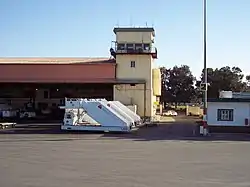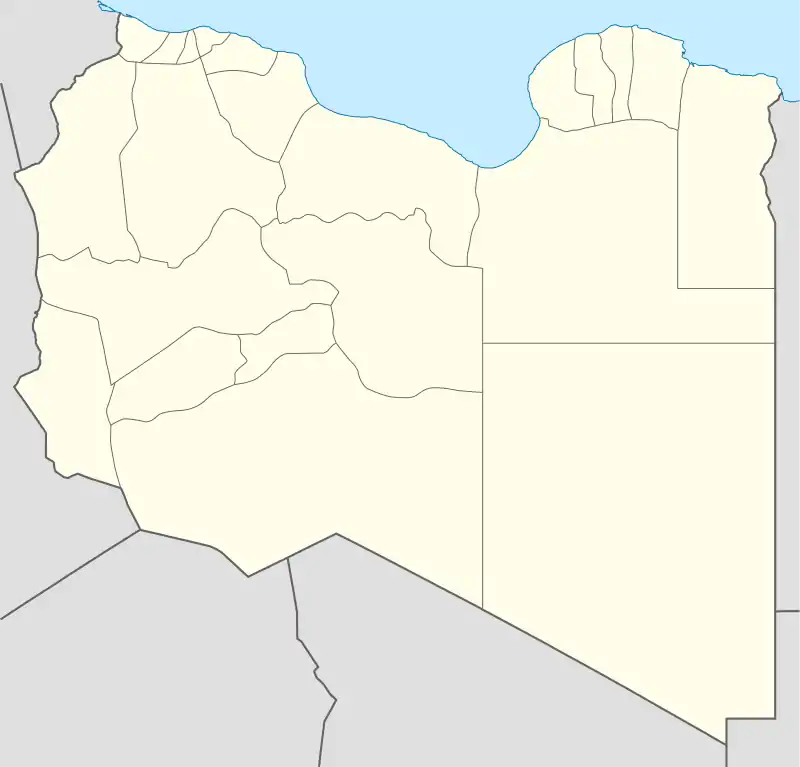Benina International Airport مطار بنينا الدولي | |||||||||||||||
|---|---|---|---|---|---|---|---|---|---|---|---|---|---|---|---|
 | |||||||||||||||
| Summary | |||||||||||||||
| Airport type | Public/Military | ||||||||||||||
| Operator | Civil Aviation and Meteorology Bureau | ||||||||||||||
| Serves | Benghazi, Libya | ||||||||||||||
| Location | Benina | ||||||||||||||
| Hub for |
| ||||||||||||||
| Elevation AMSL | 433 ft / 132 m | ||||||||||||||
| Coordinates | 32°05′50″N 20°16′10″E / 32.09722°N 20.26944°E | ||||||||||||||
| Map | |||||||||||||||
 BEN Location within Libya | |||||||||||||||
| Runways | |||||||||||||||
| |||||||||||||||
Benina International Airport (IATA: BEN, ICAO: HLLB) (Arabic: مطار بنينة الدولي) serves Benghazi, Libya. It is located in the borough of Benina, 19 kilometres (12 mi) east of Benghazi, from which it takes its name. The airport is operated by the Civil Aviation and Meteorology Bureau of Libya and is the second largest in the country after Tripoli International Airport. Benina International is also the secondary hub of both Buraq Air and flag carrier, Libyan Airlines. As of 17 July 2014 all flights to the airport were suspended due to fighting in the area.[4]
History

Benina was a Regia Aeronautica airport in 1917. During World War II the airport was used by Italian 15°Stormo, and after the United States Army Air Forces Ninth Air Force during the Eastern Desert Campaign. Known as Soluch Airfield,[5] it was used by the 376th Bombardment Group, which flew B-24 Liberator heavy bombers from the airfield between 22 February and 6 April 1943.[6] From Benina airport started the US attack on the Ploesti oil refineries in August 1943 with 178 B-24 bombers (called Operation Tidal Wave), after an Italian "Arditi" paratroopers attack that destroyed some Allied aircraft in June 1943.[7]
Once the combat units moved west, it was used as a logistics hub by Air Transport Command. It functioned as a stopover en route to Payne Field near Cairo or to Mellaha Field near Tripoli on the North African Cairo-Dakar transport route for cargo, transiting aircraft and personnel.
A new terminal with a capacity of 5 million passengers was to be developed north of the existing runway at Benina International under a 720 million LYD (€415 million) first-stage contract awarded to Canada's SNC-Lavalin as of 2008. The final cost was estimated at 1.1 billion LYD (€630 million). As with Tripoli International Airport, the new terminal was designed by Aéroports de Paris Engineering. Preliminary work and site preparation had started as of May 2008, but it remains unclear when the terminal will be open for operation.[8] The contract for Benina International Airport included construction of a new international terminal, runway, and apron. The new airport would have been part of an extensive new infrastructure programme being undertaken by the government of Libya throughout the country.
In March 2011, forces loyal to Muammar Gaddafi bombed the airport.[9] No damages were reported to facilities.[10]
The airport was closed on 16 May 2014, due to clashes in the area between militias and forces loyal to General Khalifa Haftar. As of 1 August 2014, international airlines had suspended all flights to Libya.[11] As of 5 August 2015, the airport was closed to passenger traffic.[12]
On 15 July 2017, the airport was reopened for commercial flights after three-years of closure due to fighting in Benghazi.[13]
Military use
According to reporting in Le Monde, French special forces have operated out of Benina airport.[14][15][16]
Airlines and destinations
Accidents and incidents
- On 4 April 1943, Lady Be Good, a World War II B-24 Liberator based at Soluch Field, missed the airport while returning from a bombing mission in Italy. It crashed in the Libyan Desert 434 miles (699 km) southeast of Soluch Field and was lost for 15 years.[23]
- On 9 August 1958, Central African Airways Flight 890, a Vickers Viscount registration VP-YNE, crashed 9 kilometres (5.6 mi) south east of Benina International Airport, killing 36 of the 54 people on board.[24]
- On 21 February 1973, the Boeing 727-200 that was serving this flight left Tripoli and flew to Benghazi, for its scheduled stopover. After taking off from Benghazi, it became lost because of a combination of bad weather and equipment failure over Northern Egypt. Unknowingly, its pilot, a French citizen, entered Israeli controlled airspace over the Sinai Peninsula, where it was intercepted by two Israeli F-4 Phantom IIs; once the pilot had reversed course and the plane was already on its way out of the Sinai, it was shot down by the Israeli fighter pilots after they did not receive a response to their demands for the aircraft to land. Of the 113 people on board, there were five survivors, including the co-pilot, as 108 civilians were killed in the incident.
- On 20 July 1973, Japan Air Lines Flight 404, a Boeing 747-246B was a passenger flight which was hijacked by Palestinian and Japanese terrorists. After several Middle Eastern governments refused to permit Flight 404 to land, the plane eventually touched down in Dubai, in the United Arab Emirates. After several days on the ground, the terrorists demanded the release of Kozo Okamoto, survivor of the JRA's attack on Tel Aviv's Lod Airport. After the Israeli government refused to release Okamoto, the hijackers flew the aircraft first to Damascus, Syria, and then to Benghazi, in Libya. On 23 July, 89 hours after the hijacking began, the passengers and crew were released; the hijackers then blew up the aircraft, making the incident the second hull loss of a Boeing 747.[5] The first hull-loss was also the result of hijackers.
- On 2 December 1977, a Tupolev Tu-154 passenger jet ran out of fuel and crashed near Benghazi, Libya. A total of 59 passengers were killed. The aircraft took off from King Abdulaziz International Airport in Saudi Arabia on a flight to Benina International Airport in the Libyan city of Benghazi With a crew of 6 and 159 passengers – pilgrims returning to Libya from the Hajj – on board. Egyptian airspace was closed to Libyan aircraft at the time, necessitating an indirect route to Benghazi instead of the direct route across Egypt; the crew reportedly did not plan for the longer flight time, leaving the aircraft short of fuel. As the aircraft neared Benghazi heavy fog blanketed the airport and the crew could not land the aircraft. After failing to locate the alternate airport the aircraft ran out of fuel and crashed during the crew's subsequent attempt to make an emergency landing, killing 59 passengers.
See also
References
![]() This article incorporates public domain material from the Air Force Historical Research Agency
This article incorporates public domain material from the Air Force Historical Research Agency
- ↑ "Airport information for HLLB". World Aero Data. Archived from the original on 5 March 2019.
{{cite web}}: CS1 maint: unfit URL (link) Data current as of October 2006. - ↑ Airport information for Benina International Airport at Great Circle Mapper.
- ↑ "Benghazi-Benina Airport". SkyVector. Archived from the original on 14 September 2018. Retrieved 14 September 2018.
- ↑ "Libya in Mortal Danger". Saudi Gazette. 17 July 2014. Archived from the original on 10 August 2014.
- ↑ Later Soluch Air Base
- ↑ Maurer, Maurer. Air Force Combat Units of World War II. Maxwell AFB, Alabama: Office of Air Force History, 1983. ISBN 0-89201-092-4.
- ↑ "Italian paratroopers attack in Benina airport on June 1943". 22 April 2019. Archived from the original on 24 April 2019. Retrieved 24 April 2019.
- ↑ Endress, Gunter (20 May 2008). "Libya to restructure air transport sector". London: Flightglobal. Airline Business. Archived from the original on 27 September 2012.
- ↑ "Libya: Gaddafi forces bomb Benghazi as US indicates no-fly zone support". The Scotsman. 17 March 2011. Archived from the original on 22 May 2014.
- ↑ "Gaddafi's planes strike around rebel stronghold". Reuters. 17 March 2011. Archived from the original on 22 May 2014.
- ↑ "International airlines unsure about dates for resuming Libya flights |". Libyaherald.com. August 2014. Archived from the original on 4 August 2014. Retrieved 21 August 2018.
- ↑ al-Warfalli, Ayman. "Libyan government offensive in Benghazi stalls as Islamists dig in". U.S. Archived from the original on 9 August 2015. Retrieved 21 August 2018.
- ↑ "Libya's Benghazi airport opens after three-year closure". Africanews. 15 July 2017. Archived from the original on 15 July 2017. Retrieved 15 July 2017.
- ↑ Guibert, Nathalie (24 February 2016). "La France mène des opérations secrètes en Libye". Le Monde (in French). Archived from the original on 30 June 2018. Retrieved 30 June 2018.
- ↑ Stephen, Chris; Willsher, Kim (24 February 2016). "French special forces assisting anti-Isis efforts in Libya, say sources". The Guardian. Archived from the original on 30 June 2018. Retrieved 30 June 2018.
A small French detachment has been operating from Benghazi's Benina airport, the sources have reported, assisting forces of the internationally backed Libyan authorities in Tobruk.
- ↑ Stratfor (10 March 2016). "Satellite Imagery of French Special Operations in Libya". YouTube. Archived from the original on 21 December 2021.
Stratfor Military Analyst Sim Tack explains a series of images revealing security improvements at Benina air base.
- ↑ "Afriqiyah Airways resumes Cairo routes". aaco.org. 28 September 2021.
- ↑ "Launch of regular air routes between Athens and Benghazi, Lybia".
- ↑ "Berniq Airways Adds Libya – Sudan Link from mid-Oct 2022".
- ↑ "50 New Routes Starting In October 2021". routesonline.com. 4 October 2021.
- ↑ "MARATHON AIRLINES OUTLINES PRELIMINARY SCHEDULE FROM MARCH 2023". Aeroroutes. 25 January 2023. Retrieved 25 January 2023.
- ↑ "ROYAL JORDANIAN PLANS LIBYA SERVICE RESUMPTION FROM NOV 2023". Aeroroutes. 26 July 2023.
- ↑ QMFound.com: Lady Be Good Archived 25 February 2010 at the Wayback Machine
- ↑ Accident description Aviation Safety Network Archived 25 October 2012 at the Wayback Machine (Original source "ICAO Accident Digest, Circular 59-AN/54 (171-178)) Retrieved 17 August 2015
External links
![]() Media related to Benina International Airport at Wikimedia Commons
Media related to Benina International Airport at Wikimedia Commons
.svg.png.webp)